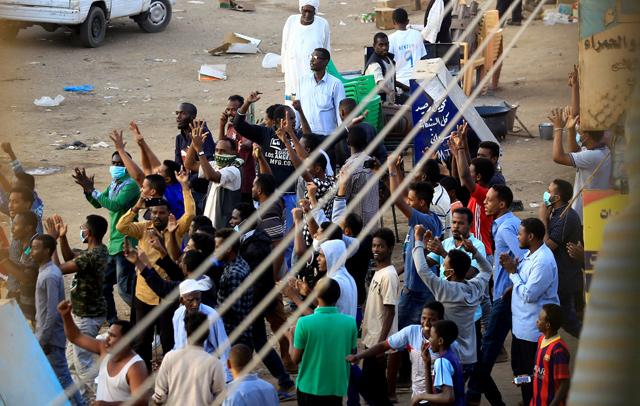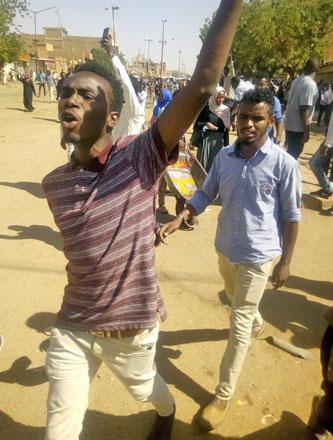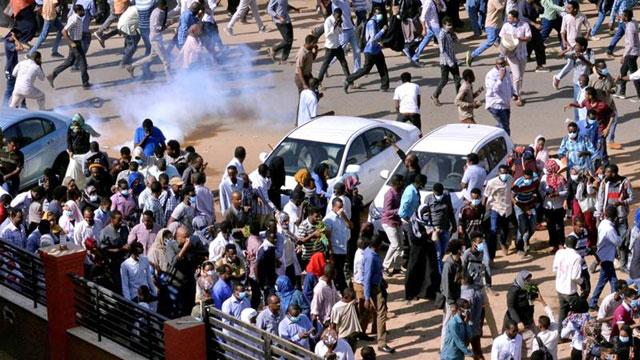You are here
Sudan’s Bashir says protests will not lead to change in government
By Reuters - Jan 14,2019 - Last updated at Jan 14,2019

Supporters of Sudan’s President Omar Al Bashir wave their national flags as they chant slogans to his favour during a rally at the Green Square in Khartoum, Sudan, on January 9 (Reuters photo)
KHARTOUM — Sudan’s President Omar Al Bashir insisted on Monday that he would not step down after weeks of violent protests and calls for him to quit over a worsening economic crisis.
Protests have rippled across Sudan since December 19 in the most sustained challenge yet to Bashir’s near 30-year rule. Security forces have used live ammunition to disperse demonstrations. The official death toll stands at 24, including two security forces personnel. Amnesty International has said that more than 40 people have been killed.
‘‘The government does not change through demonstrations,’’ Bashir said, speaking to thousands of supporters in Nyala, the main city in South Darfur, a day after protesters demonstrated there for the first time.
‘‘We said we have an economic problem and it is not solved via vandalism,’’ he said in the speech, which was shown on Sudanese television.
Since the protests started nearly four weeks ago, more than 800 people have been arrested, the government said last week. Human rights activists say those detained include political activists, civil society members and journalists. Earlier this month the Committee to Protect Journalists (CPJ) called on Sudanese authorities to release at least three journalists who had been detained after publishing columns in support of the protests.
In Khartoum on Monday, Reuters witnessed a group of journalists being arrested as they attempted to deliver a petition protesting control of the press to the media department of the national security and intelligence service.
The CPJ had earlier said that Sudanese authorities were attempting to censor news coverage of the protests. Sudanese authorities have blocked access to popular social media platforms.
Speaking in Khartoum last week, Bashir challenged his opponents to beat him at the ballot box and blamed unnamed foreign powers for provoking weeks of almost daily protests prompted by bread and currency shortages.
The protests quickly spread and turned into demonstrations against Bashir.
Sudan has slid deeper into economic crisis since the southern part of the country seceded after a referendum in 2011, taking away much of the country’s oil resources.
The crisis has deepened further since last year, when the country saw some brief protests over bread shortages.
On Monday, United Nations High Commissioner for Refugees Filippo Grandi expressed concern about the situation in Sudan.
‘‘If the situation deteriorates further there could be displacement [of people] and there could also be external displacement,’’ he told reporters during a visit to Cairo. ‘‘But we hope that the situation will be stabilised in a peaceful manner, respecting the lives of the people of course, as soon as possible.’’
The United States lifted 20-year-old trade sanctions on Sudan in October 2017, but many investors have continued to shun a country still listed by Washington as a state sponsor of terrorism.
Bashir is wanted by the International Criminal Court over charges of masterminding genocide in Darfur — charges he denies.
Related Articles
KHARTOUM — Sudanese security forces deployed in numbers in Khartoum on Thursday as demonstrators threatened to march on President Omar Al Ba
KHARTOUM — Sudanese police fired tear gas on Sunday at crowds of anti-government protesters in Khartoum and the western war-torn region of D
KHARTOUM — Dozens of journalists marched in Khartoum on Monday to demand an end to a crackdown on press freedom, eyewitnesses said, amidst t



















